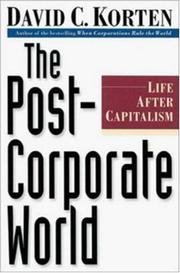| Listing 1 - 10 of 100 | << page >> |
Sort by
|
Book
ISBN: 0674789946 9780674789944 Year: 1990 Publisher: Cambridge (Mass.): Harvard university press,
Abstract | Keywords | Export | Availability | Bookmark
 Loading...
Loading...Choose an application
- Reference Manager
- EndNote
- RefWorks (Direct export to RefWorks)
Economic sociology --- Big business --- Grandes entreprises --- History. --- Histoire --- History --- -Big business --- -Economic concentration --- Business --- Business enterprises --- Industries --- Size --- -History --- Economic concentration --- Big business - United States - History --- Big business - Great Britain - History --- Big business - Germany - History --- Big business - Germany (West) - History
Book
ISBN: 0333149416 9780333149416 Year: 1974 Publisher: London: MacMillan,
Abstract | Keywords | Export | Availability | Bookmark
 Loading...
Loading...Choose an application
- Reference Manager
- EndNote
- RefWorks (Direct export to RefWorks)

ISBN: 0416348602 9780416348606 Year: 1983 Publisher: London: Methuen,
Abstract | Keywords | Export | Availability | Bookmark
 Loading...
Loading...Choose an application
- Reference Manager
- EndNote
- RefWorks (Direct export to RefWorks)

ISBN: 188720802X 1576750515 0585253927 9780585253923 1887208038 9781887208031 1583764925 9781583764923 9781576750513 9781887208024 Year: 1999 Publisher: San Francisco (Calif.): Berrett-Koehler,
Abstract | Keywords | Export | Availability | Bookmark
 Loading...
Loading...Choose an application
- Reference Manager
- EndNote
- RefWorks (Direct export to RefWorks)
Corporations --- Capitalism --- Big business --- Industry and state --- Big business. --- Industrial policy. --- Capitalism. --- Corporations. --- Grandes entreprises --- Politique industrielle --- Capitalisme --- Sociétés

ISBN: 1136511148 1315016605 0415313465 0415758572 9781136511141 9781315016603 9781136511219 9781136511288 9780415313469 9780415758574 9780415313465 1136511210 Year: 2013 Publisher: Hoboken Taylor and Francis
Abstract | Keywords | Export | Availability | Bookmark
 Loading...
Loading...Choose an application
- Reference Manager
- EndNote
- RefWorks (Direct export to RefWorks)
Effects of Mergers charts the history of six industries with a view to examining the effects of mergers. It deals both with the short and long-term effects of changes in the structure of industry and looks at issues such as whether mergers are in the public interest.
The industries covered are: Cement, Textile Printing, Soap, Glass, Motor and Brewing.
Some comparative material with industries in the USA is included.
Consolidation and merger of corporations --- Big business --- Economic concentration --- Business --- Business enterprises --- Industries --- Size --- E-books
Book
ISBN: 9781139518918 1139518917 1139506331 1107231795 1280774592 9786613684967 1139517988 1139149156 1139515403 1139514482 1139517058 9781139149150 9781139517058 9781280774591 9781107022911 1107022916 6613684961 9781139506335 9781107231795 9781139517980 9781139515405 9781139514484 9781107606777 1107606772 Year: 2012 Publisher: Cambridge ; New York : Cambridge University Press,
Abstract | Keywords | Export | Availability | Bookmark
 Loading...
Loading...Choose an application
- Reference Manager
- EndNote
- RefWorks (Direct export to RefWorks)
What are the political motivations behind firms' decisions to adopt policies that self-regulate their behavior in a manner that is beyond compliance with state, federal and local law? Public Forces and Private Politics in American Big Business advances a new understanding of the firm as a political actor that expands beyond the limited conceptualizations offered by economists and organization theorists. Timothy Werner develops a general theory of private politics that is tested using three case studies: the environment, gay rights and executive compensation. Using the conclusions of these case studies and an analysis of interviews with executives at 'Fortune 500' firms, Werner finds that politics can contribute significantly to our understanding of corporate decision-making on private policies and corporate social responsibility in the United States.
Big business --- Business and politics --- Corporate power --- E-books --- Social Sciences --- Political Science
Book
ISBN: 1783716517 1849644373 9781849644372 9780745329444 0745329446 9780745329437 0745329438 Year: 2009 Publisher: London New York New York Pluto Press Distributed in the United States of America exclusively by Palgrave Macmillan
Abstract | Keywords | Export | Availability | Bookmark
 Loading...
Loading...Choose an application
- Reference Manager
- EndNote
- RefWorks (Direct export to RefWorks)
Inequality has always been with us. With the growth of capitalism across the globe, inequalities of income, wealth and power became increasingly extreme. Written by economist Douglas Dowd, this book shows that the present banking crisis is the result of the growth of inequality across the globe. The expansion of the financial sector has brought incredible riches to a select few, at the expense of the majority. Inequality was ignored, or described as a necessary aspect of a booming global economy. With the collapse of the world markets, the fallacy of this position is clear. Inequality and the Global Economic Crisis shows how it is only by addressing inequality that we can secure the health of our economies in the future.--Publisher.
Financial crises. --- Income distribution. --- Equality --- Globalization --- Capitalism. --- Poverty. --- Big business. --- Economic aspects.
Book
ISBN: 019937855X 0199791546 9780199791545 9780199791200 0199791201 Year: 2014 Publisher: Oxford Oxford University Press, USA
Abstract | Keywords | Export | Availability | Bookmark
 Loading...
Loading...Choose an application
- Reference Manager
- EndNote
- RefWorks (Direct export to RefWorks)
"In popular imagination, environmentalism is often linked to Rachel Carson's Silent Spring and the political activism of the 1960s and '70s that moved increasing numbers of Americans to insist on a better quality of life-open spaces, clean air and water, beautification campaigns. But these interpretations have obscured the significant origins of environmentalism as a moral and intellectual broadside against the growing power of corporate capitalism, both domestically and in the postwar liberal international order the United States was enacting abroad. In Greening the Red, White, and Blue, Thomas Jundt shows how many Americans came to view powerful corporations and a federal government bent on economic growth as threats to human health and the environment. Fallout from atomic testing, air and water pollution, the proliferation of pesticides and herbicides-all connected to the growing dominance of technology and corporate capitalism in American life-led a variety of constituencies to seek solutions in what came to be known as environmentalism. In addition to political and legal campaigns to effect change, an alternative form of civic participation emerged beginning in the late-1940s as growing numbers of citizens turned to what they deemed environmentally friendly consumption practices. The goal of this politically charged consumption was not only to protect themselves and their families from harm, but also to achieve social change at a time when many believed the government was placing the desires of business before the needs of its citizens. Politicians responded to the growing environmental concerns of middle class Americans, but, in the end, continual political compromises with corporate power meant weak laws and lax enforcement. Many citizens sought refuge in an alternative "green" marketplace-including organic foods, natural-fiber clothing, alternative energy, and everyday products designed to have minimal environmental impact. In doing so, they attempted to create a community for those who shared their concerns and frustrations, as well as their vision for a different American Way. Thomas Jundt's work highlights the intertwining of consumerism and environmentalism amidst the growing power of corporate capitalism and government in postwar America"--
Green movement --- Environmentalism --- Big business --- Industries --- Green products --- Consumption (Economics) --- Environmental policy --- History. --- Environmental aspects
Book
ISBN: 1583677348 9781583677346 9781583677315 1583677313 9781583677322 1583677321 Year: 2018 Publisher: New York
Abstract | Keywords | Export | Availability | Bookmark
 Loading...
Loading...Choose an application
- Reference Manager
- EndNote
- RefWorks (Direct export to RefWorks)
"The Coming of the American Behemoth" is intended as a primer, to forge much-needed discourse on the nature of fascism, and its particular forms within the United States. Drawing from a range of authors who wrote during the 1930s and early 1940s, Michael Joseph Roberto examines how the driving force of American fascism comes, not from reactionary movements below, but from the top, namely, Big Business and the power of finance capital."--Provided by publisher.
Fascism --- Big business --- History --- Economic aspects --- Political aspects --- United States --- Politics and government
Book
ISBN: 1280659262 9786613636195 0739136992 9780739136997 0739136984 9780739136980 9781280659263 0739136976 9780739136973 Year: 2011 Publisher: Lanham Lexington Books
Abstract | Keywords | Export | Availability | Bookmark
 Loading...
Loading...Choose an application
- Reference Manager
- EndNote
- RefWorks (Direct export to RefWorks)
The Global Industrial Complex: Systems of Domination, is a groundbreaking collection of essays by leading scholars from wide scholarly and activist backgrounds who examine the entangled array of contemporary industrial complexes-what the editors refer to as ""the power complex""-that was first analyzed by C. Wright Mills in his 1956 classic work, The Power Elite.
Big business. --- Capitalism --- Power (Social sciences) --- Social institutions. --- Political aspects. --- Social aspects.
| Listing 1 - 10 of 100 | << page >> |
Sort by
|

 Search
Search Feedback
Feedback About UniCat
About UniCat  Help
Help News
News